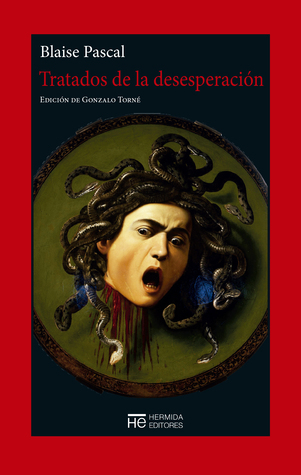- Bible
- Read the Bible
- Bible Versions
- Verse of the Day
- Reading Plans
- Verses by Topic
- Books of the Bible
- Bible Images
- Study
- Commentaries
- Concordances
- Dictionaries
- Encyclopedias
- Sermons
- Bible Atlas & Maps
- BP Wiki
- Devotionals
- Today's Devotionals
- Light of the World
- All Devotionals
- Inspirational Quotes
- More
- Picture Quotes
- Videos
- Inspirational
- Bible Study
- What The Bible Says
- Bible Q&As
- Daily Bread
- Bible by Genre
- Bible Stories
- Random Bible Verse
- Community
- Store
Tratados de la desesperación
by Blaise Pascal
«Tratados de la desesperación» se compone de una selección de los célebres «Pensamientos» que Pascal escribió con el propósito de integrarlos y articularlos en un gran tratado apologético sobre el cristianismo. En ellos encontramos lúcidas, profundas y también perturbadoras reflexiones que intentan dilucidar la cuestión vital para el hombre que es la felicidad. Con este fin, Pascal, nos sumerge en su crítica a la superioridad del racionalismo y sus valiosos vástagos: la exaltación de la razón, del Yo y todos los derivados del antropocentrismo. Mediante el cuestionamiento de estas falsas ideas, van iluminándose los senderos por donde el hombre debería caminar hacia su propia felicidad.
Los temas abordados por Pascal son muy variados: el poder del dinero en la vida humana, los peligros derivados de la inacción y la desesperación, los beneficios de aprender a estar a solas con nuestros pensamientos, el problema de vivir de la imaginación, el abuso del entretenimiento como vía de escape. Cuestiones todas ellas encaminadas a desequilibrar la balanza a nuestro favor en «la guerra civil entre la razón y las pasiones» que se libra en el seno del hombre.
Los temas abordados por Pascal son muy variados: el poder del dinero en la vida humana, los peligros derivados de la inacción y la desesperación, los beneficios de aprender a estar a solas con nuestros pensamientos, el problema de vivir de la imaginación, el abuso del entretenimiento como vía de escape. Cuestiones todas ellas encaminadas a desequilibrar la balanza a nuestro favor en «la guerra civil entre la razón y las pasiones» que se libra en el seno del hombre.
Paperback, First Edition, 140 pages
Published January 25th 2016 by Hermida Editores
© 2026 Bibleportal.com All rights reserved.

Among the contemporaries of Descartes none displayed greater natural genius than Pascal, but his mathematical reputation rests more on what he might have done than on what he actually effected, as during a considerable part of his life he deemed it his duty to devote his whole time to religious exercises.
At 16, Pascal began designing a calculating machine, which he finally perfected when he was thirty, the pascaline, a beautiful handcrafted box about fourteen by five by three inches. The first accurate mechanical calculator was born.
Pascal was dismayed and disgusted by society's reactions to his machine and completely renounced his interest in science an mathematics, devoting the rest of his life to God. He is best known for his collection of spiritual essays, Les Pensees.
Ironically, Pascal, who was a genius by any measure, with one of the finest brains of all time, died of a brain hemorrhage at the age of 39.
Among the contemporaries of Descartes none displayed greater natural genius than Pascal, but his mathematical reputation rests more on what he might have done than on what he actually effected, as during a considerable part of his life he deemed it his duty to devote his whole time to religious exercises.
He was a child prodigy who was educated by his father, a Tax Collector in Rouen. Pascal's earliest work was in the natural and applied sciences where he made important contributions to the study of fluids, and clarified the concepts of pressure and vacuum by generalizing the work of Evangelista Torricelli.
In 1646, he and his sister Jacqueline identified with the religious movement within Catholicism known by its detractors as Jansenism. Following a mystical experience in late 1654, he had his "second conversion", abandoned his scientific work, and devoted himself to philosophy and theology. His two most famous works date from this period: the Lettres provinciales and the Pensees.
In honor of his scientific contributions, the name Pascal has been given to the SI unit of pressure, to a programming language, and Pascal's law (an important principle of hydrostatics), and as mentioned above, Pascal's triangle and Pascal's wager still bear his name.
... Show more